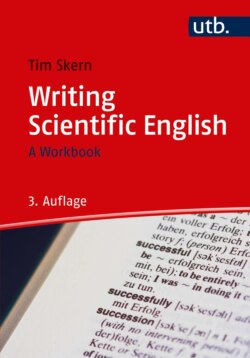Читать книгу Writing Scientific English - Timothy Skern - Страница 48
2.2.2Reviewers are humans too
ОглавлениеIn addition to examining the level of the science in a manuscript submitted for publication, reviewers are also asked to comment on the authors' level of English. Over the years, I have noticed that some reviewers appear to use the authors' affiliations as a criterion to judge the English. Indeed, almost all the native English-speaking scientists that I know in Vienna have had at least one manuscript returned with the comment that the English should be revised by a native speaker. Presumably, the reviewers did not expect well-written English manuscripts from Viennese scientists. These native English speakers included a fellow of the Royal Society, a former chair of the EMBO Science & Society Committee and me. Thus, if a reviewer suggests English revision you are in good company! In each of the three cases above, we all simply wrote back that the English had been checked by a native speaker (which was true) without making any language changes. This course of action has also been recommended by Janet Carter-Sigglow (1997), working in the translation centre of a research institution in Germany.
In short, if you receive unpleasant remarks about your level of English, do not despair. Read through your text again and see whether the reviewer is correct. Obtain the opinion of an English native-speaker and accept their comments. If they agree with the reviewer, then your manuscript will have been improved; if not, then you can write back in the way that I mentioned in the last paragraph.
Finally, reviewers themselves are also human. Here are two reviewers’ comments on the standard of English in two manuscripts written and/or read by English native speakers.
“Finally if authors should improve their English lnguage that will be helpful.”
(The misspelling of the word “language” was in the original comment)
“This study is better to understand the concepts of how they determine protein degradation in some proteins. The data are interesting, however it is not suitable for publication unless language extensively was edited."
Both manuscripts were not surprisingly returned to the journals concerned without any English language corrections.
Box 2.4Vocabulary of “A word in your ear” (Campbell, 1998)
The editor of “Nature” wrote the text cited in (Campbell, 1998). 20 words from the text (printed in blue) that may be unfamiliar are explained below. You may also be unaware of the identity of Ionesco mentioned in the text. He was a Romanian and French playwright who liked to make fun of ordinary situations and felt that much of life repeated itself without purpose.
dumbfounded – speechless with surprise
exasperate – annoy
convey – transmit
bestow – place a talent upon someone
overwhelm – overload with something
intricate – made with a complex design which is difficult to understand
sustain – keep going
ply – follow
considerable – significant or a large amount
bemoan – complain about pore
over – study closely and seriously
dismantle – take something apart
equation – an expression that certain quantities are equal to each other. They usually contain an equals sign (=). a + b = c is a basic equation.
tenure – have a permanent position, especially at a university
breed – a type or variety. This word is very important in genetics.
relish – look forward to and enjoy
nurture – look after and train
commendably – doing something in a way which deserves praise
conscientious – doing something very carefully
ineptness – inability
